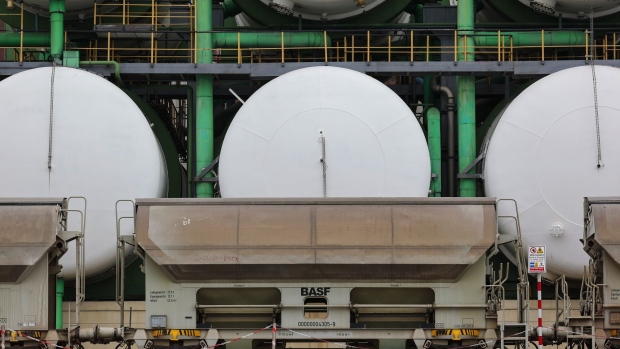Jul 27, 2022
BASF Considers Selling Gas to Grid if Russia Halts Deliveries
, Bloomberg News

(Bloomberg) -- BASF SE may sell unused natural gas back to Germany’s grid in case Russian deliveries grind to a sudden halt, according to people familiar with the matter, a move that would aid Europe’s last-ditch efforts to conserve the fuel.
BASF’s decision to further cut its gas-intensive ammonia production will enable the company to offer surplus fuel in an auction under Germany’s emergency gas supply plan, the people said, declining to be named because the deliberations are private.
Gas accounts for around 80% of the cost of making ammonia -- a key commodity that goes into fertilizer and engineering plastics -- and surging prices for the fuel have rendered the business unprofitable.
“We are reducing production at facilities that require large amounts of natural gas, such as ammonia plants,” BASF Chief Executive Officer Martin Brudermueller said Wednesday when presenting second-quarter earnings.
European energy prices extended a scorching rally on Wednesday as Russia tightened its grip on the region’s supply. Natural gas increased as much as 14%, and prices are more than 10 times higher than the usual level for this time of the year, as supplies through the key Nord Stream pipeline slumped. Germany is the largest consumer of Russian gas, which BASF and its peers use to run their factories.
BASF earlier Wednesday raised its sales and profit forecast as it managed to pass on rising prices for energy and raw materials. It also warned of a gradual cooling of the global economy and a more pronounced slowdown in Europe because of the war in Ukraine. Making ammonia accounts for around a quarter of the gas needs of BASF’s main site in Ludwigshafen, Germany.
Saving Gas
European Union countries this week reached a political agreement to cut their gas use by 15% through next winter as the prospect of a full cut-off from Russian deliveries grows increasingly likely.
Read: Mercedes May Sell Gas Back to Grid to Help With Supply Crunch
Under an auction system to begin over summer months, major German consumers and suppliers can offer their unused gas, with winning bidders getting paid for the fuel they provide, the Economy Ministry said last month. The measure was detailed as Germany elevated the risk level in its national gas emergency plan to the second-highest “alarm” phase.
Companies will post their offers at Trading Hub Europe, Germany’s gas-market manager. When supply bottlenecks occur, the hub will take up the cheapest offer.
A final decision by BASF on whether to sell any excess gas would depend on the price offered in the auction system, the people said, adding that the company may choose not to sell and instead use the gas for other processes in case of severe rationing.
©2022 Bloomberg L.P.






